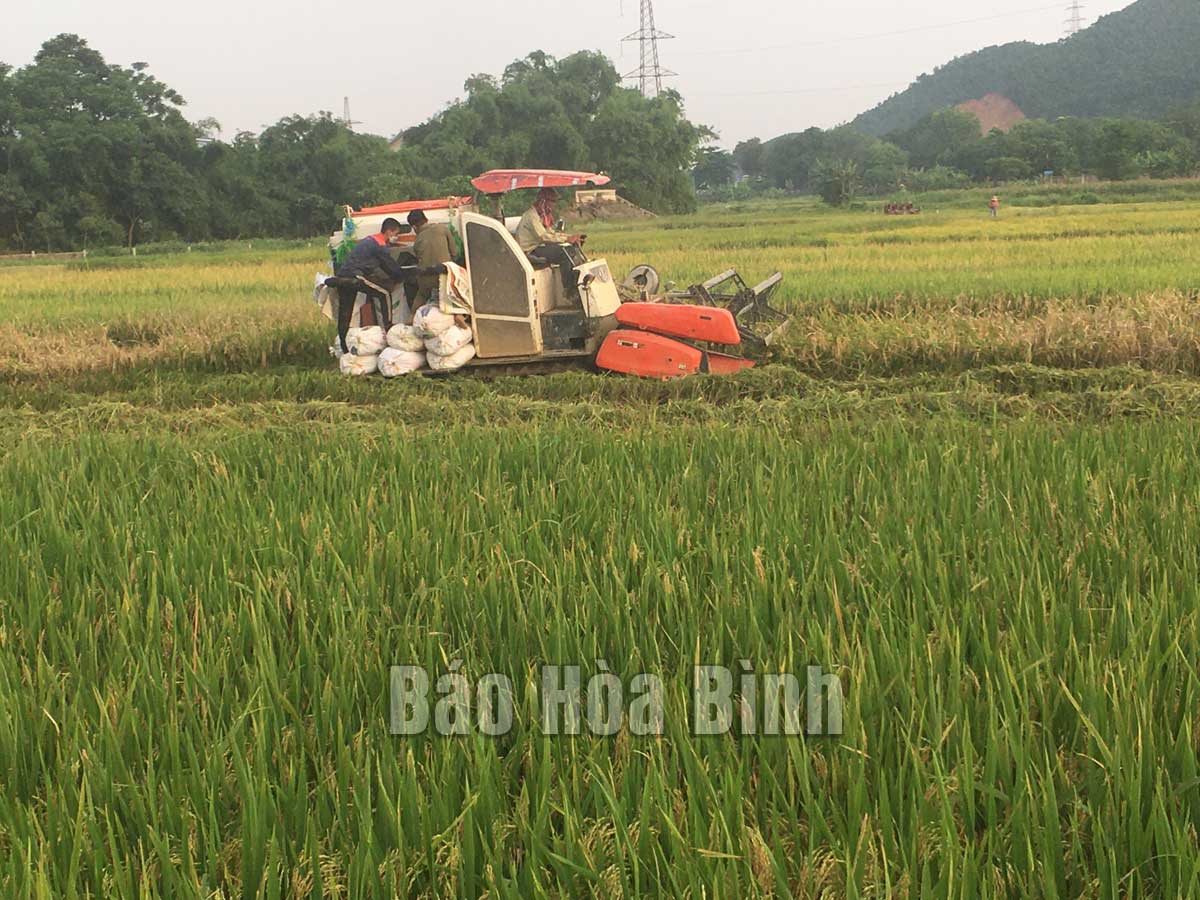
(HBO) – Over the past years, all-level Party Committees and authorities of Lac Thuy district have viewed ensuring food security as a task of special significance.

Farmers in Residential Area No. 5, Chi Ne township, Lac Thuy district, utilise mechanisation in rice harvesting.
Residential Area No. 5 has 25 hectares of farming land with 85 farming households that have actively restructured plant cultivation, using high-yield and high-quality rice varieties.
Under a scheme on agricultural restructuring for 2021-2025, Lac Thuy’s total farming land is maintained at 9,300 hectares and cultivation accounts for 51.3% of the local agro-forestry-fishery sector.
The district has also promoted the organic vegetable farming model, under which farmers, cooperatives, production groups and businesses are connected with each other, with a total area of 155 hectares, covering Chi Ne and Ba Hang Doi townships, and Dong Tam, Phu Nghia and Thong Nhat communes. Meanwhile, the area of fruit trees stands at over 1,490 hectares.
The locality has successfully rolled out the production and consumption model of Bac Huong 9 – a high-quality variety – with an area of 100 hectares in Thong Nhat, Khoan Du and Phu Thanh communes, raising the area of high-quality rice varieties to 750 hectares, making up 23% of the combined rice area in the district.
Lac Thuy orange, chicken, custard-apple, goat and tea are now major brands of the district.
Hoang Thi Thu Hang, Vice Chairwoman of the district People’s Committee, said Lac Thuy has implemented a plan on ensuring food security towards green agriculture, climate change adaptation, sustainable development and environmental protection.
Lac Thuy will adjust and supplement the land use planning scheme to better serve the agro-forestry-fishery sector in line with regulations, and attract investors in agriculture and rural development, she said./.
The Standing Board of the Hoa Binh provincial Party Committee has agreed in principle on a proposal by the Standing Board of the Party Committee of Hoa Binh city to gather feedback on the city’s 1:2000 zoning plan, which forms part of its broader urban development strategy.
Hoa Binh province has made notable progress in public administration reform and digital government development, with the satisfaction index among citizens and businesses reaching over 84%, according to recent government evaluations.
Thanks to great efforts by local authorities in recent times, the governance and public administration performance of Mai Chau district has been significantly improved.
In the afternoon of June 6, the Party Committee, the People's Council, the People's Committee and the Fatherland Front of Lac Son district solemnly held a meeting to celebrate the 139th anniversary of the district's founding (1886–2025) and the 79th anniversary of the establishment of the district's Party Committee (1946–2025). There was the attendance of Mr. Bui Van Thang, the Vice Chairman of the Provincial People's Council; Mr. Quach Tat Liem, the Vice Chairman of the Provincial People's Committee; Ms. Dang Bich Ngoc, the Deputy Head of the National Assembly Delegation of the province; as well as the former leaders of the province and district through various periods, who are the natives of the district.
Implementing the Politburo’s Resolution No. 57-NQ/TW on breakthroughs in science – technology, innovation, and digital transformation is a golden opportunity for the northern mountainous province of Hoa Binh to renew growth model, improve competitive edge and shorten digital gap.
Resolution 57-NQ/TW, issued by the Politburo on December 22, 2024, identifies sci-tech, innovation, and digital transformation as strategic breakthroughs to build a developed and prosperous nation. In Hoa Binh province, this spirit is not just a slogan, it’s being put into action through concrete initiatives that form a "new development triangle”: digital citizenship, digital economy, and digital administration.



